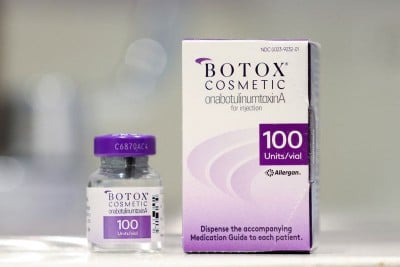 © Reuters. FILE PHOTO: A vial of Botox, owned by AbbVie, is seen next to its packaging in a photo illustration in Manhattan, New York, U.S., December 8, 2021. REUTERS/Andrew Kelly SUPN +0.26% Add to/Remove from Watchlist Add to Watchlist Add Position
© Reuters. FILE PHOTO: A vial of Botox, owned by AbbVie, is seen next to its packaging in a photo illustration in Manhattan, New York, U.S., December 8, 2021. REUTERS/Andrew Kelly SUPN +0.26% Add to/Remove from Watchlist Add to Watchlist Add Position Position added successfully to:
Position added successfully to:
Position added successfully to:
Position added successfully to:
By Leroy Leo
(Reuters) - Consumer advocacy group Public Citizen on Tuesday filed a petition with the U.S. Food and Drug Administration seeking to require makers of Botox and several similar injections to include stronger warnings about the risk of a potentially fatal muscle-paralyzing disease.
These injections, which use various versions of botulinum toxins to contract specific muscles by blocking certain nerve signals to erase wrinkles, already have a 'black box' warning in their labels about the risks of the intended effect spreading to other areas. The consumer group asked the FDA to make it clear that these adverse effects could happen even at recommended dosages.
The new petition seeks a stronger warning on the label of six toxin-based injections including market leader Botox from AbbVie (NYSE:ABBV), Revance Therapeutics (NASDAQ:RVNC)' Daxxify, Evolus (NASDAQ:EOLS)' Jeuveau, Supernus Pharmaceuticals (NASDAQ:SUPN)' Myobloc, Galderma's Dysport and Xeomin from Merz Therapeutics.
Public Citizen also asked the FDA to remove promotional statements that claim there are no definitive serious side-effects of distant spread of toxin effect associated with the toxins.
The request comes after the advocacy group analyzed over 5,400 reports of deaths, life-threatening events and other serious side effect related to Botox and rival toxin-based wrinkle treatments between January 1989 and March 2021 that were recorded in FDA's adverse events database.
The FDA maintains the database to help it identify unusual or emerging side effect trends that may require further investigation or actions, such as adding warnings to a product.
The group is asking the FDA to add clear warnings about systemic iatrogenic botulism, a condition that can cause progressive muscle paralysis if the toxin used in these products spreads beyond the intended treatment site.
The FDA said it will review the petition and respond directly to Public Citizen. Merz said it closely tracks the FDA adverse event database, and submits safety reports to the agency on a regular basis, while Revance and Evolus declined to comment. The other companies did not respond to requests for comment.
An earlier petition by Public Citizen in 2008 based on an analysis of 180 reports led to the FDA adding the current black box warning about the risk of Botox's effect spreading to other areas of the body.
The group is now asking the FDA to add a clearer warning about the risk of botulism from Botox and other treatments. The term "botulism" is only mentioned in the labeling of Botox and related drugs once, toward the end of the prescribing information, it said.
The 5,400 reported adverse events may be an understatement, the advocacy group's health services researcher Azza AbuDagga said, citing a study that found less than a tenth of adverse events related to drugs are reported.
The group is also asking the FDA to make it clear in labels that botulism cases associated with recommended doses of the products need prompt administration of botulinum antitoxins to avoid disease progression.
US Consumer group seeks stronger warnings on Botox, similar treatments